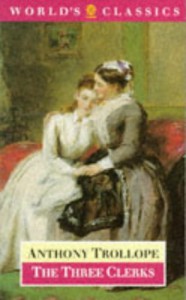The Three Clerks
 In this novel, Trollope begins to indulge in a little bit of what young people nowadays call "meta" - that is, he discusses his own characteristics as a novelist. His device is to have his youngest protagonist be a writer of pulp fiction, whose fictional readers declare he has failed to write a proper "Nemesis" or villain. This, I am sure, Trollope had heard about his own novels - but I think Trollope's ability to sympathize even with his "baddies" is one of his most endearing characteristics, and one of his strengths.
In this novel, Trollope begins to indulge in a little bit of what young people nowadays call "meta" - that is, he discusses his own characteristics as a novelist. His device is to have his youngest protagonist be a writer of pulp fiction, whose fictional readers declare he has failed to write a proper "Nemesis" or villain. This, I am sure, Trollope had heard about his own novels - but I think Trollope's ability to sympathize even with his "baddies" is one of his most endearing characteristics, and one of his strengths.Anyway, the meta is a relatively small portion of this tale; most is clearly designed along the lines of thesis (Henry Norman, the 'good' civil servant), Alaric (the 'bad' one, who takes part in stock fraud), and synthesis (Charley, who starts out bad and on the wrong path, but becomes good). The three Woodward daughters - Gertrude, Linda, and Katie, appear to be all lined up as neat as a fairy tale for matrimony to these three, but there is a shuffling in the order early in the book as Alaric decides he prefers Henry Norman's girlfriend, Gertrude, to his own, Linda. This sets up Henry's bitterness and nobility in the latter chapters when he rescues Alaric from the very worst consequences of his ill-doing, using Charley as an intermediary.
I read the chapter in Trollope's autobiography that talks about this novel, and I regret to say the one scene he picked out as being the best written - Katie's near-deathbed scene which puts lover Charles on to the moral path - was the one scene I found most stupid and sentimental, and not at all worthy of the author's pride. There seems little doubt he was trying to give his readers what they wanted (sentimental scenes being the equivalent of sexy scenes in modern romances), but that particular scenario seemed out of place to me - and besides, he couldn't bring himself to kill Katie off anyway! She recovered as inexplicably as she dropped to death's door.
Trollope can do better with his women. I thought the contrast between Gertrude (who was a tough bird to keep supporting her errant husband all the way to and through Australian exile) and Linda (much softer) was well sustained.
Much of this novel is well-observed satire on the Civil Service, and though it's all a bit exaggerated, I regret to say there was a lot I recognized.



